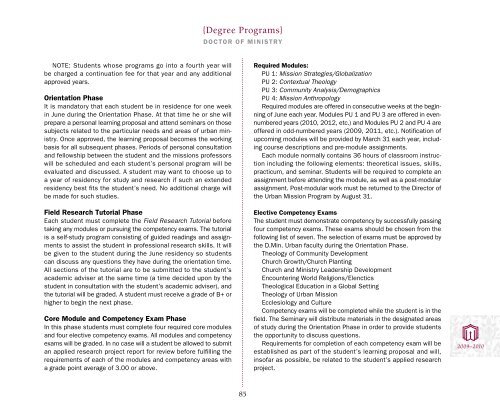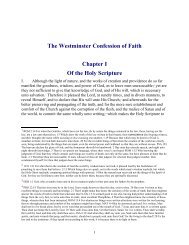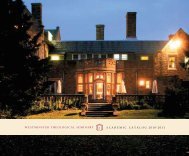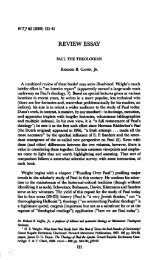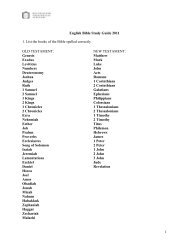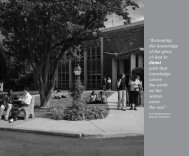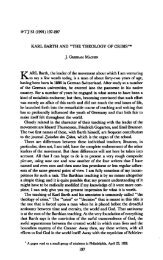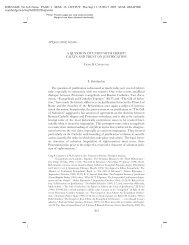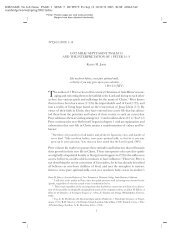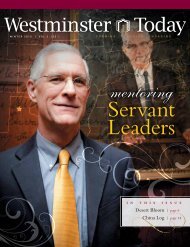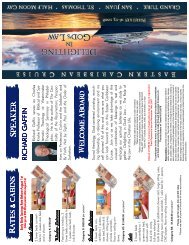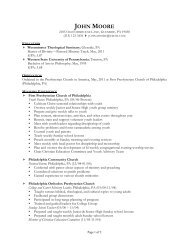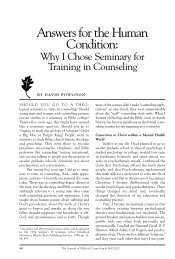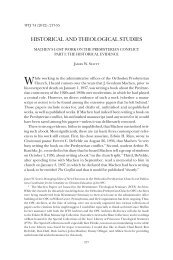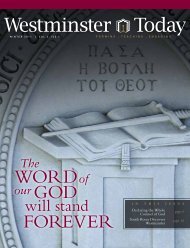2009 - 2010 Academic Catalog - Westminster Theological Seminary
2009 - 2010 Academic Catalog - Westminster Theological Seminary
2009 - 2010 Academic Catalog - Westminster Theological Seminary
Create successful ePaper yourself
Turn your PDF publications into a flip-book with our unique Google optimized e-Paper software.
{Degree Programs}<br />
Doctor of Ministry<br />
NOTE: Students whose programs go into a fourth year will<br />
be charged a continuation fee for that year and any additional<br />
approved years.<br />
Orientation Phase<br />
It is mandatory that each student be in residence for one week<br />
in June during the Orientation Phase. At that time he or she will<br />
prepare a personal learning proposal and attend seminars on those<br />
subjects related to the particular needs and areas of urban ministry.<br />
Once approved, the learning proposal becomes the working<br />
basis for all subsequent phases. Periods of personal consultation<br />
and fellowship between the student and the missions professors<br />
will be scheduled and each student’s personal program will be<br />
evaluated and discussed. A student may want to choose up to<br />
a year of residency for study and research if such an extended<br />
residency best fits the student’s need. No additional charge will<br />
be made for such studies.<br />
Field Research Tutorial Phase<br />
Each student must complete the Field Research Tutorial before<br />
taking any modules or pursuing the competency exams. The tutorial<br />
is a self-study program consisting of guided readings and assignments<br />
to assist the student in professional research skills. It will<br />
be given to the student during the June residency so students<br />
can discuss any questions they have during the orientation time.<br />
All sections of the tutorial are to be submitted to the student’s<br />
academic adviser at the same time (a time decided upon by the<br />
student in consultation with the student’s academic adviser), and<br />
the tutorial will be graded. A student must receive a grade of B+ or<br />
higher to begin the next phase.<br />
Core Module and Competency Exam Phase<br />
In this phase students must complete four required core modules<br />
and four elective competency exams. All modules and competency<br />
exams will be graded. In no case will a student be allowed to submit<br />
an applied research project report for review before fulfilling the<br />
requirements of each of the modules and competency areas with<br />
a grade point average of 3.00 or above.<br />
Required Modules:<br />
PU 1: Mission Strategies/Globalization<br />
PU 2: Contextual Theology<br />
PU 3: Community Analysis/Demographics<br />
PU 4: Mission Anthropology<br />
Required modules are offered in consecutive weeks at the beginning<br />
of June each year. Modules PU 1 and PU 3 are offered in evennumbered<br />
years (<strong>2010</strong>, 2012, etc.) and Modules PU 2 and PU 4 are<br />
offered in odd-numbered years (<strong>2009</strong>, 2011, etc.). Notification of<br />
upcoming modules will be provided by March 31 each year, including<br />
course descriptions and pre-module assignments.<br />
Each module normally contains 36 hours of classroom instruction<br />
including the following elements: theoretical issues, skills,<br />
practicum, and seminar. Students will be required to complete an<br />
assignment before attending the module, as well as a post-modular<br />
assignment. Post-modular work must be returned to the Director of<br />
the Urban Mission Program by August 31.<br />
Elective Competency Exams<br />
The student must demonstrate competency by successfully passing<br />
four competency exams. These exams should be chosen from the<br />
following list of seven. The selection of exams must be approved by<br />
the D.Min. Urban faculty during the Orientation Phase.<br />
Theology of Community Development<br />
Church Growth/Church Planting<br />
Church and Ministry Leadership Development<br />
Encountering World Religions/Elenctics<br />
<strong>Theological</strong> Education in a Global Setting<br />
Theology of Urban Mission<br />
Ecclesiology and Culture<br />
Competency exams will be completed while the student is in the<br />
field. The <strong>Seminary</strong> will distribute materials in the designated areas<br />
of study during the Orientation Phase in order to provide students<br />
the opportunity to discuss questions.<br />
Requirements for completion of each competency exam will be<br />
established as part of the student’s learning proposal and will,<br />
insofar as possible, be related to the student’s applied research<br />
project.<br />
<strong>2009</strong>–<strong>2010</strong><br />
85


